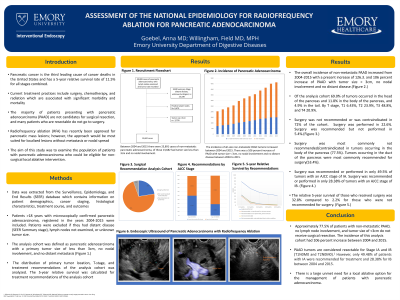Monday Poster Session
Category: Interventional Endoscopy
P2296 - Assessment of the National Epidemiology for Radiofrequency Ablation for Pancreatic Adenocarcinoma
Monday, October 23, 2023
10:30 AM - 4:15 PM PT
Location: Exhibit Hall

Has Audio

Anna Goebel, MD
University of Pennsylvania
Atlanta, GA
Presenting Author(s)
Anna Goebel, MD1, Theresa W. Gillespie, PhD, MA, BSN2, Vaishali Patel, MD2, Jordan Orr, MD2, Steven Keilin, MD2, Saurabh Chawla, MD, FACG2, Field Willingham, MD, MPH3
1University of Pennsylvania, Atlanta, GA; 2Emory University School of Medicine, Atlanta, GA; 3Emory University, Atlanta, GA
Introduction: Pancreatic cancer is the fourth leading cause of cancer death in the United States and has a 5-year relative survival rate of 12.5% for all stages combined. The majority of patients presenting with pancreatic adenocarcinoma are not candidates for resection, and many resectable patients do not undergo surgery. The introduction of endoscopic ultrasound-guided radiofrequency ablation has introduced an additional non-surgical option for local treatment for pancreatic tumors. The current study examined the US epidemiology of patients with pancreatic adenocarcinoma potentially meeting the criteria for non-surgical local ablative intervention.
Methods: Data was abstracted from the Surveillance, Epidemiology, and End Results (SEER) database. Adult patients with histologically confirmed pancreatic adenocarcinoma, registered in the years 2004–2015 were included. Eligible tumors were defined as tumors less than 3cm, with no lymph node involvement or metastatic disease. Patients were excluded if they had distant disease, lymph nodes not examined, or unknown tumor size.
Results: A total of 25,891 patients met the inclusion criteria. Of those patients, 13,682 (52.8%) had a tumor size < 3cm, with no nodal involvement and no metastatic disease. T-stage distribution was T1 6.43%, T2 23.9%, T3 48.8%, and T4 20.9%. Surgery was not recommended or was contraindicated in 70.6% of the cohort. Surgery was performed in 22.1%. Surgery was recommended but not performed in 5.4%. The 5-year survival for those who received surgery was 32.8% compared to 2.2% for those patients who were not recommended for surgery. Approximately 77.5% of patients with non-metastatic pancreatic adenocarcinoma, no lymph node involvement, and a tumor size of < 3cm did not receive surgical resection.
Discussion: There is a large unmet need for additional local ablative options for the adjunctive management of patients with pancreatic adenocarcinoma.
Disclosures:
Anna Goebel, MD1, Theresa W. Gillespie, PhD, MA, BSN2, Vaishali Patel, MD2, Jordan Orr, MD2, Steven Keilin, MD2, Saurabh Chawla, MD, FACG2, Field Willingham, MD, MPH3. P2296 - Assessment of the National Epidemiology for Radiofrequency Ablation for Pancreatic Adenocarcinoma, ACG 2023 Annual Scientific Meeting Abstracts. Vancouver, BC, Canada: American College of Gastroenterology.
1University of Pennsylvania, Atlanta, GA; 2Emory University School of Medicine, Atlanta, GA; 3Emory University, Atlanta, GA
Introduction: Pancreatic cancer is the fourth leading cause of cancer death in the United States and has a 5-year relative survival rate of 12.5% for all stages combined. The majority of patients presenting with pancreatic adenocarcinoma are not candidates for resection, and many resectable patients do not undergo surgery. The introduction of endoscopic ultrasound-guided radiofrequency ablation has introduced an additional non-surgical option for local treatment for pancreatic tumors. The current study examined the US epidemiology of patients with pancreatic adenocarcinoma potentially meeting the criteria for non-surgical local ablative intervention.
Methods: Data was abstracted from the Surveillance, Epidemiology, and End Results (SEER) database. Adult patients with histologically confirmed pancreatic adenocarcinoma, registered in the years 2004–2015 were included. Eligible tumors were defined as tumors less than 3cm, with no lymph node involvement or metastatic disease. Patients were excluded if they had distant disease, lymph nodes not examined, or unknown tumor size.
Results: A total of 25,891 patients met the inclusion criteria. Of those patients, 13,682 (52.8%) had a tumor size < 3cm, with no nodal involvement and no metastatic disease. T-stage distribution was T1 6.43%, T2 23.9%, T3 48.8%, and T4 20.9%. Surgery was not recommended or was contraindicated in 70.6% of the cohort. Surgery was performed in 22.1%. Surgery was recommended but not performed in 5.4%. The 5-year survival for those who received surgery was 32.8% compared to 2.2% for those patients who were not recommended for surgery. Approximately 77.5% of patients with non-metastatic pancreatic adenocarcinoma, no lymph node involvement, and a tumor size of < 3cm did not receive surgical resection.
Discussion: There is a large unmet need for additional local ablative options for the adjunctive management of patients with pancreatic adenocarcinoma.
Disclosures:
Anna Goebel indicated no relevant financial relationships.
Theresa Gillespie indicated no relevant financial relationships.
Vaishali Patel indicated no relevant financial relationships.
Jordan Orr indicated no relevant financial relationships.
Steven Keilin indicated no relevant financial relationships.
Saurabh Chawla indicated no relevant financial relationships.
Field Willingham: Boston Scientific – Grant/Research Support. Cancer Prevention Pharmaceuticals – Grant/Research Support. Cook Medical – Grant/Research Support. PCI Biotech – Grant/Research Support. Steris / CSA Medical – Grant/Research Support.
Anna Goebel, MD1, Theresa W. Gillespie, PhD, MA, BSN2, Vaishali Patel, MD2, Jordan Orr, MD2, Steven Keilin, MD2, Saurabh Chawla, MD, FACG2, Field Willingham, MD, MPH3. P2296 - Assessment of the National Epidemiology for Radiofrequency Ablation for Pancreatic Adenocarcinoma, ACG 2023 Annual Scientific Meeting Abstracts. Vancouver, BC, Canada: American College of Gastroenterology.
